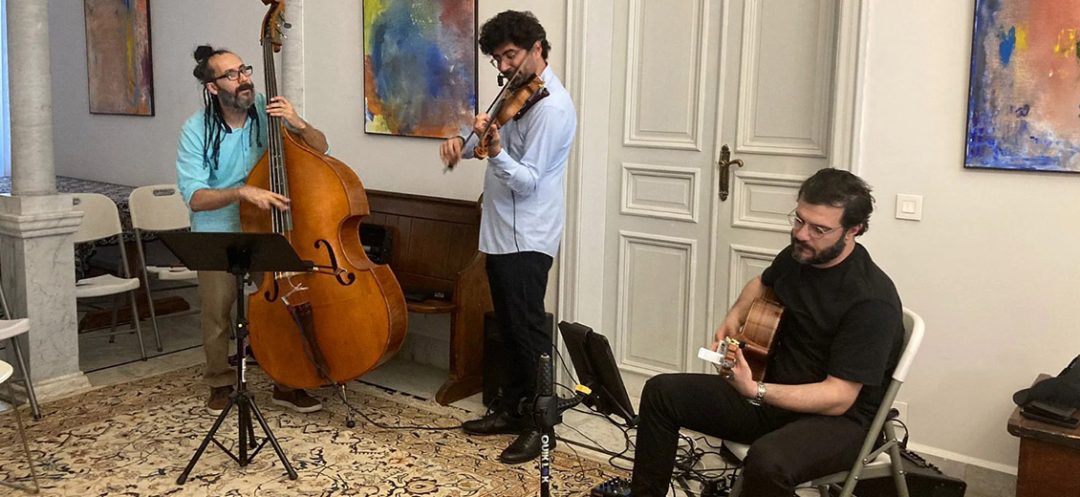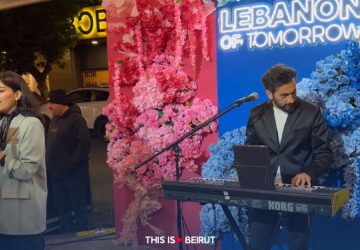Despite the challenges posed by the security situation, Beit Tabaris has successfully maintained coherent musical activity, consistently supporting young Lebanese musicians through masterclasses and concerts.
The violin masterclass was conducted remotely. Unable to come to Lebanon due to a canceled flight, Arnaud Nuvolone, the first violinist of the Paris Opera Orchestra, dedicated three long online afternoons to the six young violinists who registered for his masterclass. Thanks to the presence and organization of Mario Rahi, the first violinist of the Lebanese Philharmonic Orchestra, everything proceeded smoothly. The end-of-masterclass concert took place as planned, with the young musicians performing wonderfully, admirably accompanied on the piano by Sirvart Sabounjian, in front of an attentive and moved audience.
Maria Nakhlé began with an excerpt from Wolfgang Amadeus Mozart’s Concerto No. 4 (1756–1791), followed by Edmondo Karam with Perpetuum mobile by Ottokar Novacek (1866–1900), Alec Donerian with the first movement of Édouard Lalo’s Symphonie espagnole (1823–1892), Ramzi Kandalaft with Recitativo and Scherzo by Fritz Kreisler (1875–1962) and an Elegy of his own composition, which he performed with Marwa Eid, who then played the first movement of Camille Saint-Saëns’ Concerto No. 3 (1835–1921). The concert concluded with the young Zoé Saadé (12 years old) masterfully performing Charles de Bériot’s Concerto No. 9 (1802–1870). But it was not over yet! The students and their teachers (Mario Rahi and Fred Nasr) came together for a very moving encore, the Prelude by Dmitri Shostakovich (1906–1975).
In the second week, Beit Tabaris hosted a series of three concerts. First, Serge Moukarzel, a brilliant young pianist who graduated from the prestigious Tchaikovsky Conservatory in Moscow, presented a program that created a dialogue between Russian and Lebanese music. The program included Georges Baz (1926–2012), The Market in the Morning (from Sketches), Pyotr Ilyich Tchaikovsky (1840–1893), Three Pieces Op. 72, the last piano cycle of the Russian composer, Toufic Succar (1922–2015), Ar Rozanna and Minuet in G Major Op. 13 in homage to Maurice Ravel, Nikolai Medtner (1880–1951), Three Pieces from Forgotten Melodies, Anton Arensky (1861–1906), Two Pieces from Essays on Forgotten Rhythms, Abdel Rahman el Bacha (born in 1958), Two Preludes, Sergei Rachmaninoff (1873–1943), Three Preludes Op. 23, and finally Naji Hakim (born in 1955), Lebanese Overture, a piece built on traditional Lebanese melodies that thrilled the audience.
The second concert was also dedicated to the piano, featuring an excellent young pianist, Daniel Karout, who is also a composer. His program spanned from Baroque to contemporary music, starting with a piano transcription of an aria from a cantata by Johann Sebastian Bach (1685–1750), Schafe können sicher weiden (Sheep May Safely Graze). This was followed by two pieces by Karout, Intermezzo in E-flat and Prelude in E Major, pastoral and impressionist-inspired works that greatly pleased the audience. Then came Ludwig van Beethoven’s Sonata No. 23 in F Minor, Op. 57, known as the Appassionata, a moving and tumultuous work that the pianist performed with great virtuosity. The recital ended with a moment of great meditative and repetitive beauty, featuring violinist Maya Maalouf with a sensitive and poetic touch, performing Spiegel im Spiegel (Mirror in the Mirror) by Estonian composer Arvo Pärt (born in 1935).
The spring season at Beit Tabaris concluded with the exceptional and unprecedented Mirdad duo, consisting of three instrumentalists well-versed in scholarly music, who, to relax, combined their talents to offer a festival of pieces traveling through the memory of the past between classical music, jazz and tango. Mario Rahi on violin, Raffi Mandalian on guitar and Jack Estephan on double bass, in perfect harmony and obvious complicity, performed a selection of works by composers as varied as Charles Trenet, Ariel Ramirez, Astor Piazzola and Richard Galliano, as well as traditional Russian, Romanian and Mouachahat music. A highly successful musical fusion, this trio, which is just one year old, certainly has a bright future ahead.
Beit Tabaris invites its loyal followers (who are increasing in number!) to join them from the end of June for a colorful summer season!
Article penned by Zeina Saleh Kayali
https://www.agendaculturel.com/articles/le-printemps-a-refleuri-a-beit-tabaris





